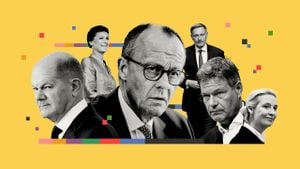On February 24, 2025, European Union leaders, led by Ursula von der Leyen, made a significant visit to Kyiv to express support for Ukraine on the poignant third anniversary of Russia’s invasion. This gathering of high-profile politicians underscored the EU’s commitment to backing Ukraine amid continued conflict with Russia, marked by increasing military aid and stringent sanctions against the aggressor.
During the visit, which also included EU Council President Costa and numerous commissioners, significant announcements were made, including the allocation of €3.5 billion to support Ukraine, reflecting the EU’s resolve to bolster the Eastern European nation against Russian hostilities. Von der Leyen highlighted the EU's contributions, stating, “The EU and its member states have supported Ukraine with €134 billion. That is more than anyone else,” as reported by the Telegraph.
Ukrainian President Volodymyr Zelenskyy, addressing the gathered leaders, reiterated his commitment to pursuing peace, saying, “This year should be the beginning of real, lasting peace.” He called for all prisoners of war to be exchanged between Ukraine and Russia, advocating for fair negotiations to conclude the drawn-out conflict. Zelenskyy emphasized, “Putin will not give us peace or give it to us for something. We must win peace through strength, wisdom, and unity.”
The EU leaders’ visit coincided with the implementation of new sanctions against Russia, targeting economic measures aimed at decreasing the Kremlin's financial resources to sustain the war. The EU Foreign Policy Chief expressed determination, stating, “Every new sanctions package deprives the Kremlin of money to conduct this war.” Such sanctions reflect the EU’s strategy to hold Russia accountable for its actions, reinforcing solidarity among member states.
A notable aspect of the discussions was the plan to integrate Ukraine’s electricity market with the EU’s by the end of 2025, highlighting the EU's push for energy security both for Ukraine and its member states. This strategic move not only symbolizes Ukraine’s incorporation within European frameworks but also serves as a step toward economic recovery post-conflict.
The somber backdrop of this anniversary is underscored by the persistent violence and destruction wrought by the war, which has claimed countless lives and left deep scars on the Ukrainian populace. Official figures on military casualties remain unclear, but Zelenskyy noted over 46,000 Ukrainian soldiers killed, with western estimates indicating even higher numbers. This grim reality emphasizes the urgency for peace negotiations.
The geopolitical dynamics surrounding this conflict were also highlighted by Zelenskyy’s criticism of recent U.S. diplomatic efforts toward Russia, which he contended were being conducted without Ukrainian representation. These negotiations raised concerns among EU leaders, who felt it imperative to reinforce their support for Ukraine, lest it be sidelined from discussions impacting its sovereignty and future.
During the anniversary event, various world leaders participated, with 13 physically present and many more participating via video. Such wide-ranging involvement signals a collective international stance aimed at pressuring Russia and advocating for Ukraine’s rights and reforms. The presence of high-ranking officials symbolizes not only solidarity but also the necessity of unity among allied nations against common adversaries.
Reflecting on the enduring challenges faced by Ukraine, German President Frank-Walter Steinmeier remarked on the resilience shown by the Ukrainian people throughout three years of conflict. He reiterated the longstanding bond between Germany and Ukraine, affirming Germany’s continued support.
Overall, the EU leaders' visit to Kyiv marks another important chapter in the enduring crisis, representing both renewed financial commitments and strategic discussions aimed at resolving the conflict. With leaders pledging their unwavering support, Ukraine continues to navigate the tumultuous waters of war with hope for eventual peace and recovery.
Collectively, these events highlight the international community's commitment to Ukraine as it continues to repel aggression and strive for sovereignty. The push for peace, coupled with tangible forms of support, reflects both urgency and determination among allies to see Ukraine secure its future on its own terms.



